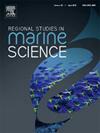Scoping review of marine fisheries governance in the Philippines: Goals, instruments, actions, opportunities and challenges
IF 2.1
4区 环境科学与生态学
Q3 ECOLOGY
引用次数: 0
Abstract
Effective fisheries governance has long been a challenge to achieve across the globe with critical implications for food security and livelihoods in coastal zones. This is especially true for the Philippines, an archipelagic country with abundant coastal biodiversity. While scholars have investigated specific elements of fisheries governance in the Philippines, none has sought to make holistic sense in terms of the coherence of its goals, instruments, actions, opportunities, and challenges. To address this gap, a scoping review was conducted based upon 160 published articles. Results of the study reveal that marine fisheries governance in the Philippines is primarily dominated by participatory governance, specifically co-management, which encourages public-private partnerships. This collaborative arrangement is legally empowered by legislation that provides the mandate for the decentralization of fisheries governance – the Local Government Code of 1991 and the Philippine Fisheries Code of 1998. Marine fisheries governance is primarily oriented towards biodiversity conservation, an overarching goal necessary to achieve other social, economic, and cultural goals. In order to achieve these goals, a combination of hard and soft instruments is typically employed in governance operations in tandem with, predominantly, surveillance and enforcement actions. Opportunities in fisheries governance are principally institutional factors (i.e. institutional linkages), whereas challenges are mostly resource-oriented factors (i.e. illegal fishing). More broadly, marine fisheries governance in the Philippines has evolved in response to historical political processes and especially the dynamics of power relations among key actors – the state, market and civil society - and the struggle for decolonization.
菲律宾海洋渔业治理范围审查:目标、工具、行动、机遇和挑战
长期以来,有效的渔业管理一直是全球面临的一项挑战,对沿海地区的粮食安全和生计有着至关重要的影响。对于菲律宾这个拥有丰富沿海生物多样性的群岛国家来说,情况尤其如此。尽管学者们对菲律宾渔业治理的具体内容进行了研究,但没有学者试图从目标、工具、行动、机遇和挑战的一致性方面进行整体分析。为弥补这一不足,我们对已发表的 160 篇文章进行了范围界定研究。研究结果表明,菲律宾的海洋渔业治理主要以参与式治理为主,特别是鼓励公私合作的共同管理。1991 年的《地方政府法》和 1998 年的《菲律宾渔业法》规定了渔业治理权力下放的任务,从法律上赋予这种合作安排以权力。海洋渔业治理的主要方向是保护生物多样性,这是实现其他社会、经济和文化目标所必需的总体目标。为了实现这些目标,通常在治理行动中采用软硬结合的手段,主要是监督和执法行动。渔业治理中的机遇主要是制度因素(即制度联系),而挑战主要是资源导向因素(即非法捕捞)。更广义地说,菲律宾的海洋渔业治理是随着历史政治进程,特别是国家、市场和民间社会等主要行为体之间的权力关系动态以及非殖民化斗争而演变的。
本文章由计算机程序翻译,如有差异,请以英文原文为准。
求助全文
约1分钟内获得全文
求助全文
来源期刊

Regional Studies in Marine Science
Agricultural and Biological Sciences-Ecology, Evolution, Behavior and Systematics
CiteScore
3.90
自引率
4.80%
发文量
336
审稿时长
69 days
期刊介绍:
REGIONAL STUDIES IN MARINE SCIENCE will publish scientifically sound papers on regional aspects of maritime and marine resources in estuaries, coastal zones, continental shelf, the seas and oceans.
 求助内容:
求助内容: 应助结果提醒方式:
应助结果提醒方式:


